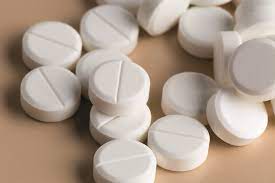Amoxicillin (amoxicillin) is a penicillin antibiotic used to treat a variety of bacterial infections.
It works by binding to the penicillin-binding protein of bacteria. These bacteria are essential for the production and maintenance of bacterial cell walls. If left unchecked, bacteria can multiply rapidly in the body and cause harm. Amoxicillin inhibits these penicillin-binding proteins so that susceptible bacteria cannot continue to replicate, killing the bacteria. This effect is called the bactericidal effect.
Amoxil is a broad-spectrum oral antibiotic that works against many different bacterial organisms. Antibiotic medicines only treat bacterial infections, not viral infections (such as the common cold or the flu).
Generally, you can take amoxicillin with or without food. However, taking amoxicillin without food can cause an upset stomach. If an upset stomach occurs, you can reduce these symptoms by taking it with meals. It is best to take extended-release formulations within an hour after meals.
For oral suspension, shake the solution before each use. Your pharmacist should include a measuring device with all suspensions. Use this measuring device (not a household spoon or cup) for accurate dosing.
You can add a measured dose of oral suspension to milk, juice, water, ginger ale, or formula to help improve taste before eating. You must drink the entire mixture to get the full dose. For a better taste, you can also ask for a flavored sweetener for the antibiotic suspension.
Distribute the dose evenly throughout the day. You can take it in the morning, afternoon, and at bedtime. Continue taking the medicine as directed by your healthcare provider, even if you start to feel better. Stopping antibiotics before the entire treatment is complete can cause bacteria to grow back. If the bacteria grow stronger, you may need higher doses or more effective antibiotics to cure your infection.
Store amoxicillin in a dry place at room temperature. Do not keep this medication in the bathroom or kitchen.
You can store liquid suspensions in the refrigerator to make their taste more bearable, but they should not be stored in the refrigerator. Do not discard any remaining liquid. For more information on how and where to throw away your medicine, contact your local pharmacy.
Healthcare providers may prescribe amoxicillin for reasons other than those approved by the Food and Drug Administration (FDA). This is called off-label use.
Amoxicillin will start working as soon as you start taking it. You may start to feel better after a few days, but make sure to complete the entire treatment.
This is not a complete list of side effects, other side effects may occur. A medical professional can advise you about side effects. If you experience other effects, please contact your pharmacist or medical professional. You can report side effects to the FDA at www.fda.gov/medwatch or 1-800-FDA-1088.
Generally, amoxicillin is well tolerated by people. However, it may cause some side effects in some people. It is important to understand the possible side effects of amoxicillin and their severity.
Call your healthcare provider right away if you have any of these serious side effects. If your symptoms are life-threatening or you think you have a medical emergency, call 911.
Your healthcare provider will prescribe amoxicillin for a specific length of time. It is important to take this medication exactly as directed to avoid possible consequences.
Prolonged and overuse of antibiotics like amoxicillin can lead to antibiotic resistance. When antibiotics are misused, bacteria change their properties so that antibiotics cannot fight them. When the bacteria develop on their own, infections in infected people can become more difficult to treat.
Long-term antibiotic treatment can also kill off excess good bacteria, making the body more susceptible to other infections.
Amoxil may cause other side effects. Call your healthcare provider if you have any unusual problems while taking this medication.
If you experience serious side effects, you or your provider can send a report to the Food and Drug Administration (FDA)’s MedWatch Adverse Event Reporting Program or by phone (800-332-1088).
The dose of this medicine will vary for different patients. Follow your doctor’s order or directions on the label. The information below includes only the average dose of this medicine. If your dose is different, do not change it unless your doctor tells you to.
The amount of medicine you take depends on the strength of the medicine. In addition, the dose you take each day, the time allowed between doses, and the length of time you take the medicine depend on the medical problem for which you are using the medication.
Newborn babies (3 months or younger) have not yet fully developed kidneys. This may delay the clearance of the drug from the body, increasing the risk of side effects. Neonatal prescriptions for amoxicillin will require dose modification.
For mild to moderate infections, the recommended maximum dose of amoxicillin is 30 mg/kg/day divided into two doses (every 12 hours).
Dosing for children weighing 40 kg or more is based on adult recommendations. If the child is over 3 months old and weighs less than 40 kg, the prescriber can modify the child’s dose.
Adults 65 years and older should use this medication with caution to prevent kidney toxicity and the risk of side effects. Your provider may adjust your dose if you have severe renal insufficiency.
Although generally safe for nursing infants, it is important to consult your healthcare provider before taking amoxicillin.
When breastfeeding, certain levels of the drug may be passed directly to the baby through breast milk. However, since these levels are much lower than those in the blood, there is no significant risk to your child. As in pregnancy, it is reasonable to use amoxicillin if needed.
If you miss a dose, take it as soon as you remember. If it’s almost time for your next dose, skip the missed dose and continue with your regular intake schedule. Do not take additional or multiple doses at the same time. If you miss a few doses or a full day of treatment, contact your healthcare provider for advice on what to do.
In general, an overdose of amoxicillin is not associated with significant symptoms other than the aforementioned side effects. Taking too much amoxicillin can cause interstitial nephritis (inflammation of the kidneys) and crystalluria (irritation of the kidneys).
If you think you or someone else may have overdosed on amoxicillin, call your healthcare provider or poison control center (800-222-1222).
If your or your child’s symptoms do not improve within a few days, or if your symptoms get worse, talk to your doctor.
This medicine may cause a serious allergic reaction called anaphylaxis. Allergic reactions can be life-threatening and require immediate medical attention. Call your doctor right away if you have a rash; itching; shortness of breath; trouble breathing; trouble swallowing; or any swelling of your hands, face, mouth, or throat after you or your child received this medicine.
Amoxicillin may cause diarrhea, which can be severe in some cases. It may happen 2 months or more after you stop taking this medicine. Do not take any medicines or give your child medicines for diarrhea without checking with a doctor. Diarrhea medicines may make diarrhea worse or last longer. If you have any doubts about this, or if mild diarrhea persists or worsens, consult your doctor.
Before you have any medical tests, tell the attending doctor that you or your child are taking this medicine. The results of some tests may be affected by this medicine.
In some young patients, tooth discoloration may occur while using this medicine. Teeth may look brown, yellow, or gray. To help prevent this, brush and floss your teeth regularly or have your teeth cleaned by a dentist.
Birth control pills may not work while you are using this medicine. To avoid pregnancy, use another form of birth control while taking birth control pills. Other forms include condoms, diaphragms, contraceptive foam, or jelly.
Do not take other medicines unless discussed with your doctor. This includes prescription or over-the-counter medicines (over-the-counter [OTC]) and herbal or vitamin supplements.
Amoxil is usually a well-tolerated drug. However, there may be reasons why you should not take this particular antibiotic.
Individuals who are severely allergic to amoxicillin or similar antibiotics should not take this medication. Notify your healthcare provider if you develop signs of an allergic reaction (eg, hives, itching, swelling).
Amoxicillin has mild drug interactions. It is important to let your healthcare provider know of any other prescription and over-the-counter medicines you are taking.
Also, the combination of blood thinner medicines and amoxicillin can cause difficulty clotting. If you are taking blood thinners, your healthcare provider may monitor your clotting closely to determine if your medication dose needs to be changed.
This is a list of drugs prescribed for the target disease. This is not a list of medicines that are recommended to be taken with Amoxil. You should not take these medicines at the same time. If you have any questions, please consult your pharmacist or healthcare practitioner.
No, you should not take amoxicillin if you are truly allergic to penicillin. They are in the same class of drugs, and your body may react in the same negative way. If you have any concerns, you should contact your healthcare provider.
Be sure to wash your hands, take antibiotics exactly as directed by your doctor, and do not store antibiotics for future use. In addition, timely vaccination can also help prevent bacterial infections.
Lastly, do not share your antibiotics with others, as their conditions may require different treatments and a full course of treatment.
To date, there is limited information on whether alcohol can be consumed while taking antibiotics, but it is generally not recommended. Drinking alcohol can interfere with the body’s healing process, cause dehydration, and enhance amoxicillin’s potential side effects, such as nausea, vomiting, and diarrhea.
Post time: Jun-07-2022







